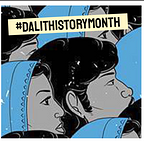My Dalitness Saved Me
- by Akanksha Prakash
To a millennial Dalit woman, born into a middle-class family that prioritizes her education over timely matrimony, Gratitude comes easily. Hope heralds this gratitude, Guilt follows it. And over decades, as she searches for exit-routes out of casteist, racist patriarchy, she keeps buckling under the weight of these three emotions.
She knows as a child, education will get her to places — to an IIT or AIIMS. Out of her small town, away from small minds. To America, maybe where big dreams land. She hopes. She steadies to soar, eyes on the moon, toes digging ground. Her Dalit father hopes with her, through her. He has named her Desire. She is his first-born first, daughter second. He beams with pride as she scores top grades, and masters English language — clauses and all. He hopes she’ll have it all — career (for sure), marriage and kids (fingers crossed) — in that order of priority. She hopes to disentangle herself from casteist configurations of her present society. She survives the present by living in the future.
When the future arrives, it is a present she feels cheated by. Her PhD hasn’t annihilated her caste. Her high-paying job isn’t patriarchy-free. Her lovers become exes — already weak, narcissistic, Brahmin or White. She is successful, but lonely, Americanized but Dalit, hurt but hopeful. Still hopeful. And grateful that she got to where she is at. Grateful that she says no to abuse, and that her Dalit father still speaks with her. Still praises her. Still hopes with her, for her. Lonely, but firm in his beliefs, he has her back for daring to love, not settle, even at almost 40. She is hopeful, grateful, guilty for all of it.
When she’s a child, she senses what that familiar teen-aged boy does to her isn’t right. She tells her mother how she’s sometimes touched by that boy, and her Dalit mother doesn’t doubt her, scold her, or hug her. The next day the boy is gone. The “thing” is never discussed again. Dalit or not, it is an Indian family. Things get shoved under the rug. Except the rug here is thin, and things bulge up from under it. She will keep stepping on them until she’s older, richer, and wounded enough to seek therapy. She will share this incident with her future partners, who’ll resent her for shutting down “pedo” humor.
So, at least the mother believes her story. In this family, they don’t believe in sin. The girl accepts, uncounseled, that she has not become any dirtier than she already was. She isn’t touched “like that” again until she understands what molestation is. When she finally does, she is grateful at least it wasn’t “penetrative” — whatever happened to her at 7. She is grateful her Dalit mother believed her little truth. She is grateful she was saved — from rape, not confusion, not guilt. She is guilty when even years later, she is extra-sensitive to pedo humor.
She is guilty, she was too much of a girl, and has become a lot of a woman. She is also guilty that she could not be enough, as either, and knows not what enough is. She is guilty that she scares them — men, with what she has done without their maleness. She is guilty for all the times she bends, yields, and shrinks. She is made to feel guilty that she still stands taller. She doesn’t mind the difference, but is guilty for the shame it induces in men. She is guilty that she sacrifices more for her men than for feminists — Savarna and White.
She hopes for love, regardless, in spaces that are free. She knows she is free, and gratefully owes her freedom to her Dalit origin — her Father and Mother and to what their ancestors bore. But she also bears the guilt of being free in an unfree world where people — Savarna, White, and their ilk- continue to discard love for power and greed.
Author bio: Akanksha Prakash spent her formative years in Varnasi, India. She received a PhD in Psychology from Georgia Institute of Technology and a Bachelor of Technology degree from the Indian Institute of Technology (IIT), Roorkee. She now lives in New York and tries to make sense of caste and other identities through writing, while working full time at Google as a User Experience Researcher.
